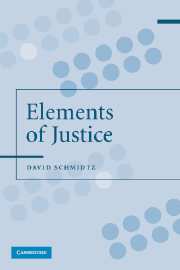Book contents
- Frontmatter
- Contents
- Acknowledgments
- PART 1 WHAT IS JUSTICE?
- PART 2 HOW TO DESERVE
- PART 3 HOW TO RECIPROCATE
- 13 Reciprocity
- 14 What Is Reciprocity?
- 15 Varieties of Reciprocity
- 16 Debts to Society and Double Counting
- 17 The Limits of Reciprocity
- PART 4 EQUAL RESPECT AND EQUAL SHARES
- PART 5 MEDITATIONS ON NEED
- PART 6 THE RIGHT TO DISTRIBUTE
- References
- Index
13 - Reciprocity
Published online by Cambridge University Press: 05 June 2012
- Frontmatter
- Contents
- Acknowledgments
- PART 1 WHAT IS JUSTICE?
- PART 2 HOW TO DESERVE
- PART 3 HOW TO RECIPROCATE
- 13 Reciprocity
- 14 What Is Reciprocity?
- 15 Varieties of Reciprocity
- 16 Debts to Society and Double Counting
- 17 The Limits of Reciprocity
- PART 4 EQUAL RESPECT AND EQUAL SHARES
- PART 5 MEDITATIONS ON NEED
- PART 6 THE RIGHT TO DISTRIBUTE
- References
- Index
Summary
The prosecutor was astounded. Under her breath, she seethed. “Six months probation! The guy's as guilty as sin! He should do five years hard labor!”
The judge spoke again to a stunned courtroom. “This is a court of justice, and I have above all sworn to uphold principles of justice. In passing sentence, I've been guided by that solemn oath. After due deliberation I conclude that the overriding principle in this case is the principle of reciprocity. The crime of which the defendant has been found guilty is extremely serious, but the overriding consideration in determining sentence was that, well, I owed the guy a favor. I am bound by justice to pass sentence as I have. This court is adjourned. ”
As with desert, reciprocity inspires skepticism. On one hand, it seems obvious that when we return a favor to someone who has been good to us, we do something that (other things equal) is at least good, maybe even morally required. Yet, Allen Buchanan recently began an article by declaring, “There is a strain of thought in the history of ethics that surfaces from time to time in the work of powerful thinkers and that threatens to shatter the basic conceptual framework within which our legal system and commonsense morality formulate the problems of justice. This idea may be called justice as reciprocity.” To Buchanan, justice as reciprocity implies that duties of justice obtain only among those who can do each other favors.
- Type
- Chapter
- Information
- The Elements of Justice , pp. 73 - 74Publisher: Cambridge University PressPrint publication year: 2006



